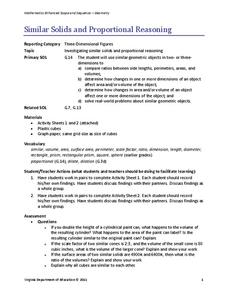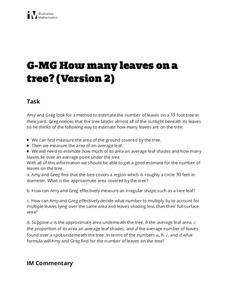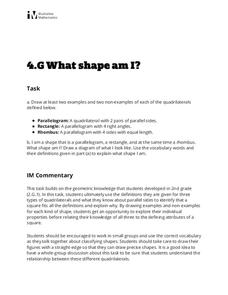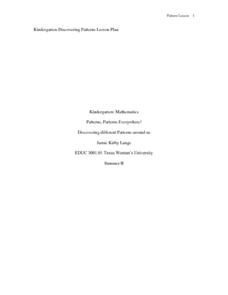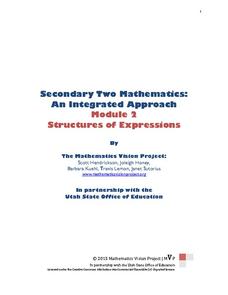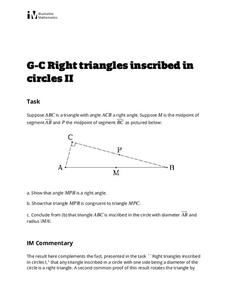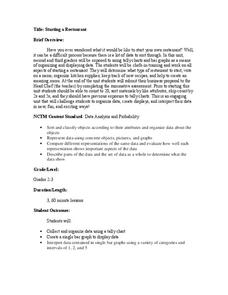Virginia Department of Education
Similar Solids and Proportional Reasoning
Double the dimensions, quadruple the surface area. Pairs build similar prisms and compare the ratios of their surface areas and volumes to the ratio of the heights. Given two similar cones, partners determine the ratios of the lateral...
Curated OER
Real Numbers
In this math learning exercise, students evaluate the expressions that use integers. They also differentiate between the values of two integers as greater or less than.
Education.com
Measure School Supplies
Ever wonder how long a pair of scissors are? Find out with this simple measuring activity in which pupils use the provided ruler to determine the length of four common classroom supplies.
Super Teacher Worksheets
Improper Fractions & Mixed Numbers
Young mathematicians demonstrate their understanding of part-whole relationships in a fraction skills instructional activity. Presented with a series of mixed numbers and improper fractions, learners must correctly convert each of them...
Illustrative Mathematics
How Many Leaves on a Tree?
This is great go-to activity for those spring or fall days when the weather beckons your geometry class outside. Learners start with a small tree, devising strategies to accurately estimate the leaf count. They must then tackle the...
Illustrative Mathematics
How Many Leaves on a Tree? (Version 2)
A second attack at figuring out the number of leaves on a tree, this activity makes both an excellent follow-up to version 1 and a stand-alone activity. Learners practice setting parameters and deciding acceptable estimate precision, and...
Shodor Education Foundation
Simple Maze Game
Avoid the mines and win the game! Young scholars direct a robot through a minefield by plotting points. Their goal is to reach the target in as few moves as possible.
Scholastic
Soccer Balls
Add some variety to your teaching of two-digit multiplication with this fun skills practice exercise. Presented with a geometric design of six soccer balls each with two-digit multiplication problems written inside of them, students must...
Curated OER
Patterns in the Multiplication Table
Explore patterns in the multiplication table in order to deepen your third graders' understanding of this essential skill. Implement this activity as a whole-class lesson, allowing students to work in pairs or small groups to support...
Illustrative Mathematics
What Shape Am I?
Sharpen your pencil and grab a ruler, it's time to draw some quadrilaterals! Given the definition of a parallelogram, rectangle, and rhombus, learners draw examples and nonexamples of each figure. The three definitions are then used to...
Texas Woman’s University
Patterns, Patterns Everywhere!
Not only is pattern recognition an essential skill for young children to develop, it's also a lot of fun to teach! Over the course of this lesson, class members participate in shared readings, perform small group activities, and complete...
Student Puzzles
Primary Long Division
Dividing large numbers can be a long and frustrating process for young mathematicians, but after completing these skills practice worksheets they'll be masters of long division.
Mathematics Vision Project
Structures of Expressions
This comprehensive unit investigates transformations of quadratics, having learners follow "Optima" through the development and growth of her quilting business. Deftly weaving the story into the mathematical mechanics, the unit gives...
Collaborative Learning Project
Four in a Row Addition and Subtraction
Scroll down to find four fun addition and subtraction partner game boards, complete with endless opportunities for practice with numbers 0-38. Kids choose numbers from a number box and, depending on the game, either find the sum or the...
K-5 Math Teaching Resources
Multiplication Chart
This is not your run-of-the-mill multiplication chart. Going beyond the standard 12 x 12 limit, this resource includes multiplication facts up through 12 x 20, making it great for supporting children as they continue working toward being...
Illustrative Mathematics
Right Triangles Inscribed in Circles I
One of the basic properties of inscribed angles gets a triangle proof treatment in a short but detailed exercise. Leading directions take the learner through identifying characteristics of a circle and how they relate to angles and...
Illustrative Mathematics
Right Triangles Inscribed in Circles II
So many times the characteristics of triangles are presented as a vocabulary-type of lesson, but in this activity they are key to unraveling a proof. A unique attack on proving that an inscribed angle that subtends a diameter must be a...
National Security Agency
Starting a Restaurant
Through an engaging unit, chefs-in-training will sort and classify data using tally charts. Learners will also create bar graphs to display restaurant data and interpret data from bar graphs using a variety of categories. This is a fun...
Curated OER
Geometry Project
Proofs are usually an intimidating assignment. An engaging lesson focused on geometric proofs may reduce the anxiety! Pupils choose between several triangle proofs to complete and work on completing them. The assignment also gives a...
Curated OER
Sphere Dressing
Geometric design makes a fashion statement! Challenge learners to design a hat to fit a Styrofoam model. Specifications are clear and pupils use concepts related to three-dimensional objects including volume of irregular shapes and...
Achieve
Spread of Disease
Viruses can spread like wildfire, and mathematics can model the speed of infection. Given a function, scholars analyze it to describe the spread of a disease within a stadium. Learners find the initial number infected and the maximum...
Willow Tree
Fibonacci and Other Sequences
Fibonacci is an interesting sequence that forms some unique patterns. Learners explore sequences that do not have the typical arithmetic and geometric patterns. They identify the pattern and find the next consecutive terms....
Willow Tree
Midpoint and Distance Formulas
The shortest distance between two points is a straight line. Learners use the Pythagorean Theorem to develop a formula to find that distance. They then find the midpoint using an average formula.
Willow Tree
Line Plots
You can't see patterns in a jumble of numbers ... so organize them! Learners take a set of data and use a line plot to organize the numbers. From the line plot, they find minimum, maximum, mean, and make other conclusions about the data.


